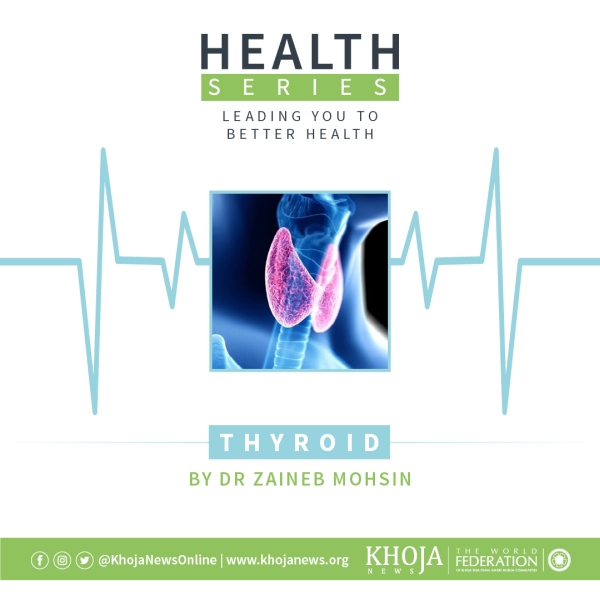HYPOTHYROIDISM
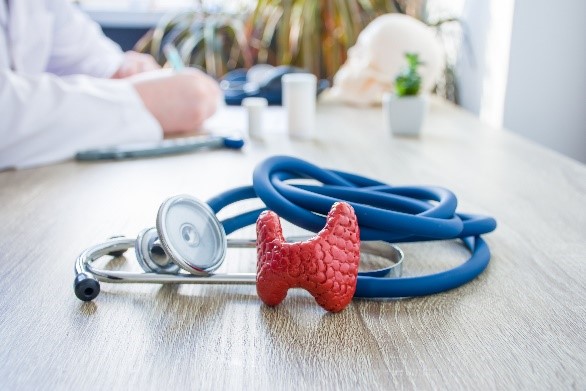
What is hypothyroidism?
The thyroid is a gland in your neck that produces a hormone called thyroxine. Hypothyroidism is the name given to the condition resulting from an underactive thyroid gland.
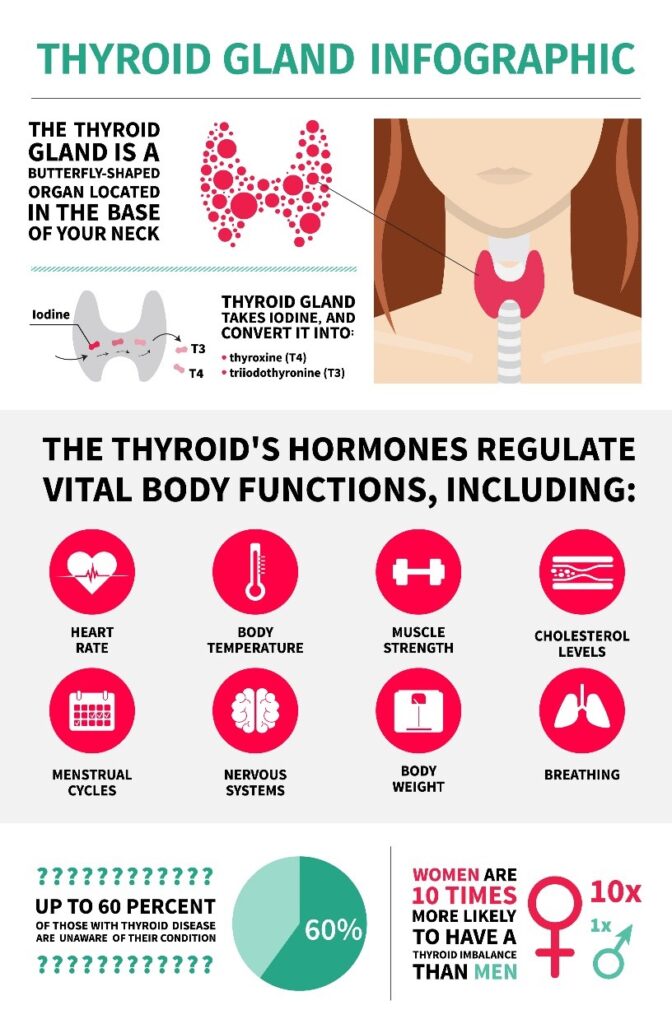
Which nutrients are important for thyroid health?
Several nutrients are important:
Iodine
Iodine is an essential mineral that is needed to make thyroid hormones. Iodine deficiency is very common and affects nearly one-third of the world’s population. However, it is less common in people from developed countries. If you have an iodine deficiency, consider adding iodized table salt to your meals or eating more iodine-rich foods like seaweed, fish, and eggs.
Selenium
Selenium helps “activate” thyroid hormones so they can be used by the body. It may also protect the thyroid gland from damage by free radicals as it is an anti-oxidant. Adding selenium-rich foods like brazil nuts, tuna, eggs and legumes to your diet is a great way to boost your selenium levels.
Zinc
Like selenium, zinc helps the body “activate” thyroid hormones. Zinc deficiencies are rare in developed countries. Good sources are beef and chicken.

Who develops hypothyroidism?
Having an underactive thyroid gland (hypothyroidism) is ten times more common in women than it is in men. Hypothyroidism affects 2 women in every 100; in men it affects 2 in 1,000. It becomes more common with increasing age. However, it can occur at any age and can affect anyone. Other common risk factors include:
• A family history of hypothyroidism.
• A personal or family history of other autoimmune disorders.
• Worldwide, iodine deficiency is the most common cause of hypothyroidism. (Your body needs iodine to make thyroxine.) This affects some countries more commonly than others, depending on the level of iodine in the diet. Therefore, salt in developed countries is usually iodized.
What causes hypothyroidism?
The most common cause in adults is autoimmune thyroid disease. This is when the body attacks its own cells. The most common form is known as ‘Hashimoto’s thyroiditis’ . Other causes include thyroid surgery, some medications and diseases of the pituitary gland.
However, it is important to remember that hypothyroidism can be present from birth in about 1 in 4000 births, which is why all new-borns should be tested for thyroid disease.
What are the symptoms of hypothyroidism?
The symptoms are usually of gradual onset. Low levels of thyroid hormone result in a slowing down of the mental and physical processes of the whole body. This can result in:
• fatigue
• constipation
• muscle weakness and aches
• heavier and longer periods
• fertility problems
• weight gain
• increased sensitivity to cold
• dry skin
• thinning hair
• hoarse voice
• puffy face
• slow speech
• low mood
• slow heart-beat
• raised blood pressure
• raised cholesterol
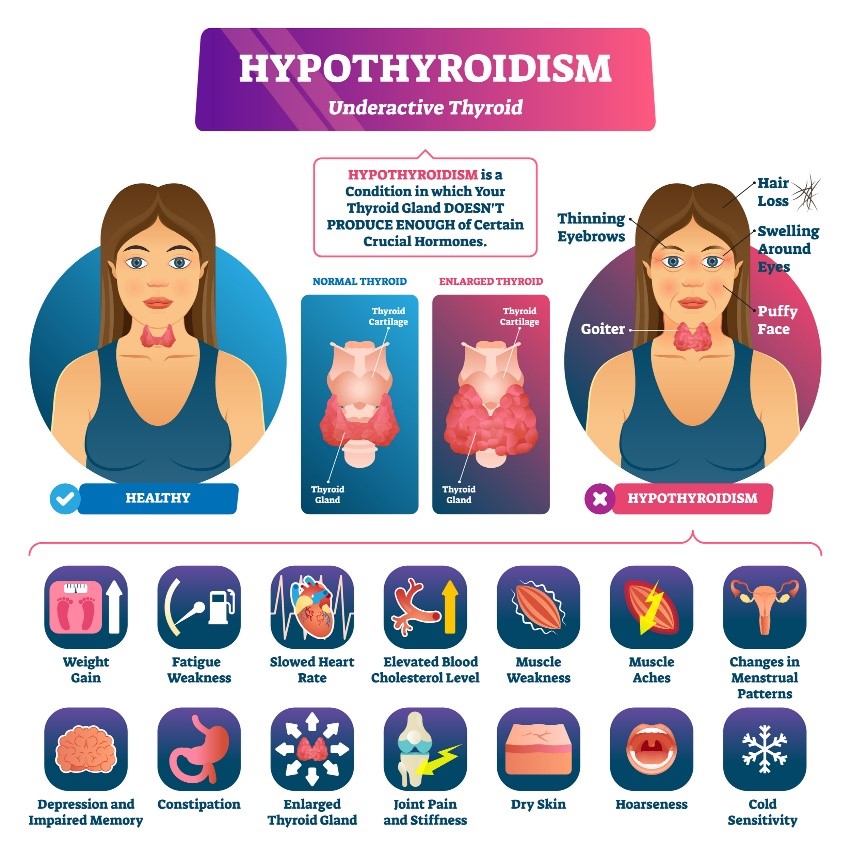
How is hypothyroidism diagnosed?
Because the symptoms are so non-specific, the best way to diagnose an underactive thyroid is by blood tests. A thyroid function test is a simple and accurate way to check whether your thyroid gland is working properly. TSH and T4 are usually checked. In hypothyroidism, the TSH is high and the T4 is low. Sometimes thyroid antibodies are checked to confirm an autoimmune cause.
What imaging tests do doctors use to diagnose and find the cause of thyroid disease?
Sometimes thyroid disease is associated with an unusually enlarged thyroid gland, called a goitre. In such cases, at times, your doctor may ask for an ultrasound of the thyroid to look to see if there are any lumps on the thyroid that need to be looked at closely.
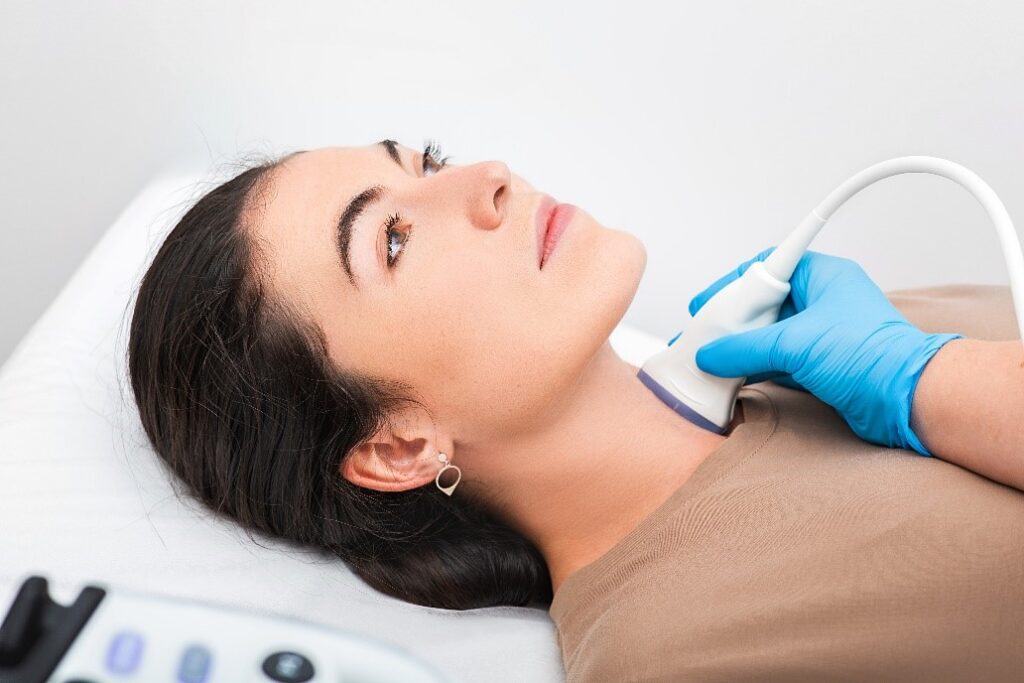
What is subclinical hypothyroidism (borderline thyroid disease, mild thyroid failure)?
This is a mildly underactive thyroid without symptoms that can only be detected by blood tests. When the TSH is raised with a normal T4, it indicates mild thyroid failure or subclinical hypothyroidism. You should have regular blood tests to follow this as you may have an increased risk of eventually developing hypothyroidism and may benefit from treatment.
However, in nearly 4 out of 10 people with subclinical hypothyroidism, the blood tests go back to normal on their own, without treatment ever being needed.
What is the treatment for hypothyroidism?
Your doctor will prescribe synthetic thyroxine called levothyroxine.
Most patients require 1.6 mcg per kg body weight usually between 100 and 150mcg a day, but the dose can vary from 50mcg or up to 300mcg a day, depending on your needs. If you are over the age of 60 or have heart disease, the dose of thyroxine will be increased gradually. During this period you will have regular thyroid function tests, usually every six to eight weeks, to adjust the dose of your medication.
Levothyroxine is best taken in the morning, with water, on an empty stomach, at least half an hour before eating and drinking anything including tea and coffee. You should wait at least four hours before taking other tablets and multi-vitamins.
The correct dose of levothyroxine is one that restores good health. In most patients this will be associated with a thyroid-stimulating hormone (TSH) reading that is at the lower end of normal and a level of thyroxine (T4) towards the upper end of the reference range.
It may take a few months for you to start to feel better.
Once the correct dose has been established it is unlikely to vary, although it is still important to have a blood test each year just to make sure.
Some patients treated with levothyroxine have persistent complaints despite normal TSH levels. Such patients may be considered with combination therapy of levothyroxine and tri-iodothyronine (LT4 and LT3) under the supervision of an experienced endocrinologist although this is not common practice.
Levothyroxine is produced by several manufacturers. Some patients do not feel as well with certain brands. This might be related to differences in the other ingredients or excipients in the medication and it may be worthwhile trying to have the same brand every time you purchase the medication.
If you are planning a pregnancy you should let your doctor know and ideally have a blood test before you conceive. As soon as you know you are pregnant, and if you are already taking levothyroxine, it is recommended that the dosage is increased immediately by 25-50mcg daily. You should then arrange to have a thyroid function test as soon as possible.
What is the outcome?
Most people get better on levothyroxine treatment, although they usually have to stay on it for life, except in some cases of hypothyroidism after pregnancy. If you are treated for hypothyroidism, a blood test each year is needed to make sure you are still on the right dose. It may take a few months to feel better and your doctor is there to support you if you have any concerns.
Authored by:
Dr Zaineb Mohsin
MBBch, MSc in Critical care (UK), MRCP(UK)
Qualified as a physician, trained in Endocrinology and Diabetes from Imperial NHS Trust and currently working as a research fellow in Metabolic bone disease at Oxford University



